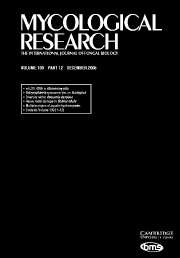Crossref Citations
This article has been cited by the following publications. This list is generated based on data provided by
Crossref.
Esslinger, Theodore L.
2002.
Recent Literature on Lichens—186*.
The Bryologist,
Vol. 105,
Issue. 3,
p.
478.
Stocker-Wörgötter, Elfie
Elix, John A.
and
Grube, Martin
2004.
Secondary Chemistry of Lichen-forming Fungi: Chemosyndromic Variation and DNA-analyses of Cultures and Chemotypes in the Ramalina farinacea Complex.
The Bryologist,
Vol. 107,
Issue. 2,
p.
152.
Mohr, Fiona
Ekman, Stefan
and
Heegaard, Einar
2004.
Evolution and taxonomy of the marine Collemopsidium species (lichenized Ascomycota) in north-west Europe.
Mycological Research,
Vol. 108,
Issue. 5,
p.
515.
Andersen, Heidi L.
and
Ekman, Stefan
2005.
Disintegration of the Micareaceae (lichenized Ascomycota): a molecular phylogeny based on mitochondrial rDNA sequences.
Mycological Research,
Vol. 109,
Issue. 1,
p.
21.
Cordeiro, Lucimara M.C.
Reis, Rodrigo A.
Cruz, Leonardo M.
Stocker-Wörgötter, Elfriede
Grube, Martin
and
Iacomini, Marcello
2005.
Molecular studies of photobionts of selected lichens from the coastal vegetation of Brazil.
FEMS Microbiology Ecology,
Vol. 54,
Issue. 3,
p.
381.
Miadlikowska, Jolanta
Kauff, Frank
Hofstetter, Valérie
Fraker, Emily
Grube, Martin
Hafellner, Josef
Reeb, Valérie
Hodkinson, Brendan P.
Kukwa, Martin
Lücking, Robert
Hestmark, Geir
Otalora, Monica Garcia
Rauhut, Alexandra
Büdel, Burkhard
Scheidegger, Christoph
Timdal, Einar
Stenroos, Soili
Brodo, Irwin
Perlmutter, Gary B.
Ertz, Damien
Diederich, Paul
Lendemer, James C.
May, Philip
Schoch, Conrad L.
Arnold, A. Elizabeth
Gueidan, Cécile
Tripp, Erin
Yahr, Rebecca
Robertson, Connie
and
Lutzoni, François
2006.
New insights into classification and evolution of the Lecanoromycetes (Pezizomycotina, Ascomycota) from phylogenetic analyses of three ribosomal RNA- and two protein-coding genes.
Mycologia,
Vol. 98,
Issue. 6,
p.
1088.
Crespo, Ana
Lumbsch, H. Thorsten
Mattsson, Jan-Eric
Blanco, Oscar
Divakar, Pradeep K.
Articus, Kristina
Wiklund, Elisabeth
Bawingan, Paulina A.
and
Wedin, Mats
2007.
Testing morphology-based hypotheses of phylogenetic relationships in Parmeliaceae (Ascomycota) using three ribosomal markers and the nuclear RPB1 gene.
Molecular Phylogenetics and Evolution,
Vol. 44,
Issue. 2,
p.
812.
Reese Næsborg, Rikke
Ekman, Stefan
and
Tibell, Leif
2007.
Molecular phylogeny of the genus Lecania (Ramalinaceae, lichenized Ascomycota).
Mycological Research,
Vol. 111,
Issue. 5,
p.
581.
THELL, Arne
HÖGNABBA, Filip
ELIX, John A.
FEUERER, Tassilo
KÄRNEFELT, Ingvar
MYLLYS, Leena
RANDLANE, Tiina
SAAG, Andres
STENROOS, Soili
AHTI, Teuvo
and
SEAWARD, Mark R. D.
2009.
Phylogeny of the cetrarioid core (Parmeliaceae) based on five genetic markers.
The Lichenologist,
Vol. 41,
Issue. 5,
p.
489.
VONDRÁK, Jan
ŘÍHA, Pavel
ARUP, Ulf
and
SØCHTING, Ulrik
2009.
The taxonomy of theCaloplaca citrinagroup (Teloschistaceae) in the Black Sea region; with contributions to the cryptic species concept in lichenology.
The Lichenologist,
Vol. 41,
Issue. 6,
p.
571.
EKMAN, Stefan
2009.
Bacidia rosellizans, a new lichen species from the taiga belt.
The Lichenologist,
Vol. 41,
Issue. 5,
p.
481.
Sérusiaux, Emmanuël
van den Boom, Pieter
and
Ertz, Damien
2010.
A two-gene phylogeny shows the lichen genus Niebla (Lecanorales) is endemic to the New World and does not occur in Macaronesia nor in the Mediterranean basin.
Fungal Biology,
Vol. 114,
Issue. 7,
p.
528.
Llop, Esteve
2010.
Bacidia punica (Ramalinaceae), a new corticolous species from the Mediterranean region.
The Bryologist,
Vol. 113,
Issue. 2,
p.
365.
FRYDAY, Alan M.
and
LENDEMER, James C.
2010.
Reassessment of the genusCatillochroma(lichenized Ascomycota,Ramalinaceae).
The Lichenologist,
Vol. 42,
Issue. 5,
p.
587.
VONDRÁK, Jan
ŠOUN, Jaroslav
SØGAARD, Majbrit Zeuthen
SØCHTING, Ulrik
and
ARUP, Ulf
2010.
Caloplaca phlogina, a lichen with two facies; an example of infraspecific variability resulting in the description of a redundant species.
The Lichenologist,
Vol. 42,
Issue. 6,
p.
685.
Lumbsch, H. Thorsten
Parnmen, Sittiporn
Rangsiruji, Achariya
and
Elix, John A.
2010.
Phenotypic disparity and adaptive radiation in the genus Cladia (Lecanorales, Ascomycota).
Australian Systematic Botany,
Vol. 23,
Issue. 4,
p.
239.
&, Markus Hauck
and
Wirth, Volkmar
2010.
New Combinations inBacidina.
Herzogia,
Vol. 23,
Issue. 1,
p.
15.
Printzen, Christian
2010.
Progress in Botany, Vol. 71.
Vol. 71,
Issue. ,
p.
233.
ŠOUN, Jaroslav
VONDRÁK, Jan
SØCHTING, Ulrik
HROUZEK, Pavel
KHODOSOVTSEV, Alexander
and
ARUP, Ulf
2011.
Taxonomy and phylogeny of theCaloplaca cerinagroup in Europe.
The Lichenologist,
Vol. 43,
Issue. 2,
p.
113.
Joshi, Yogesh
Vondrák, Jan
Vondráková, Olga
Nguyen, Thi Thuy
and
Hur, Jae-Seoun
2011.
Caloplaca allochroa (lichenized Ascomycetes), a new saxicolous lichen species from South Korea.
Mycotaxon,
Vol. 117,
Issue. 1,
p.
261.




